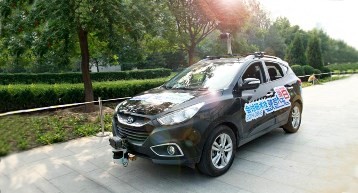Chinese Internet search giant Baidu Inc. has announced plans to field its own autonomous car in China within three years as it joins the race to develop self-driving cars, the Wall Street Journal reported.
Wang Jing, a Baidu senior vice president, told The Wall Street Journal that the company has set up a new business unit that will focus on autonomous vehicles for use as public shuttles. Wang will head the new unit, the report added.
Other tech companies, from Alphabet Inc.'s Google to Samsung Electronics Co. and carmakers from Toyota Motor Corp. to Tesla Motors Inc., are reportedly building components and technology for self-driving and Internet-connected cars.
The report said that Baidu's plan came as Google is reportedly closer to commercializing its self-driving car technology, hiring an auto-industry veteran to run its project, and is now tackling more complicated maneuvers such as making right turns at stop lights.
Baidu also plans to use its mapping data and "deep-learning" technology to expand its scope beyond online search.
Last year, the company hired Stanford researcher Andrew Ng, who helped set up Google's artificial-intelligence effort, to head its research center in Sunnyvale, California. Baidu said that Ng is among the researchers involved in Baidu's car project.
The report said that Baidu is now road-testing two prototype BMW 3 Series Gran Turismo autonomous cars in Beijing's northern outskirts, including on the city's Fifth Ring Road.
Wang added that Baidu is discussing with Chinese and foreign automakers as it is planning to expand its fleet. The company wants its future vehicles to run on fixed routes or within set urban areas.
"We will cooperate with some governments to provide shared vehicles like a shuttle service; it could be a car or van, but for public use," Wang said.
Boston Consulting Group said in April that self-driving cars will not hit the road until 2025, but only in more controlled situations such as automated ride-sharing services.
In the Swiss city of Sion and in Trikala in Greece, driverless buses have already been put into use. A Japanese prefecture in Tokyo will soon be experimenting with an unmanned taxi service beginning next year, the report said.
In September, a prototype self-driving bus made by Chinese bus maker Zhengzhou Yutong Bus Co. Ltd. completed a 33-kilometer (20-mile) drive on an intercity road in central China.
Baidu said their autonomous cars will be equipped with a laser radar, or Lidar, and sensors and cameras with varying visibility ranges. Its software draws on Baidu's highly detailed maps as well as its "deep-learning" technology.
The car has been tested on highways hundreds of times, with several trips each day, the company said.



























